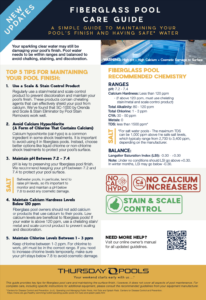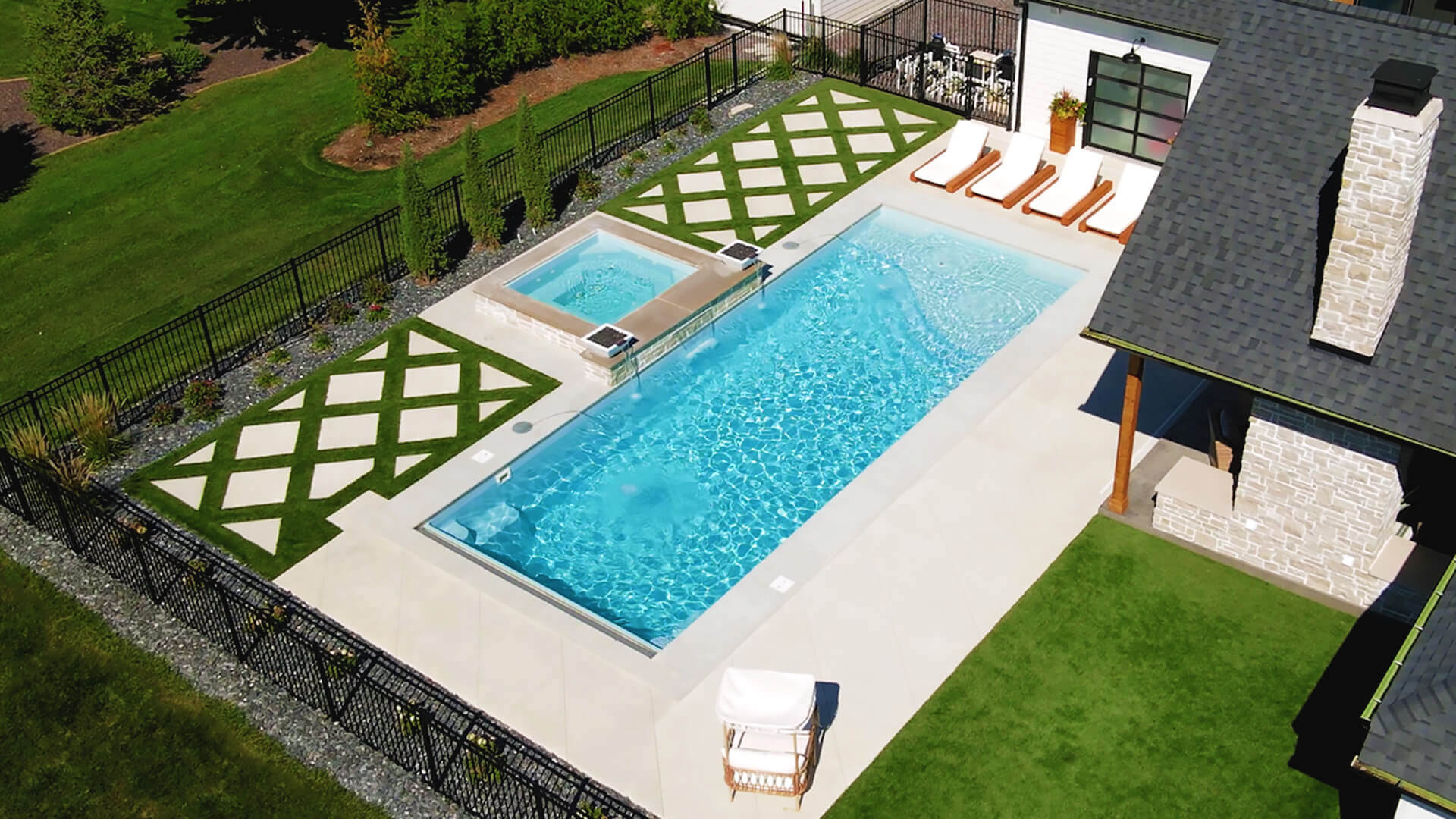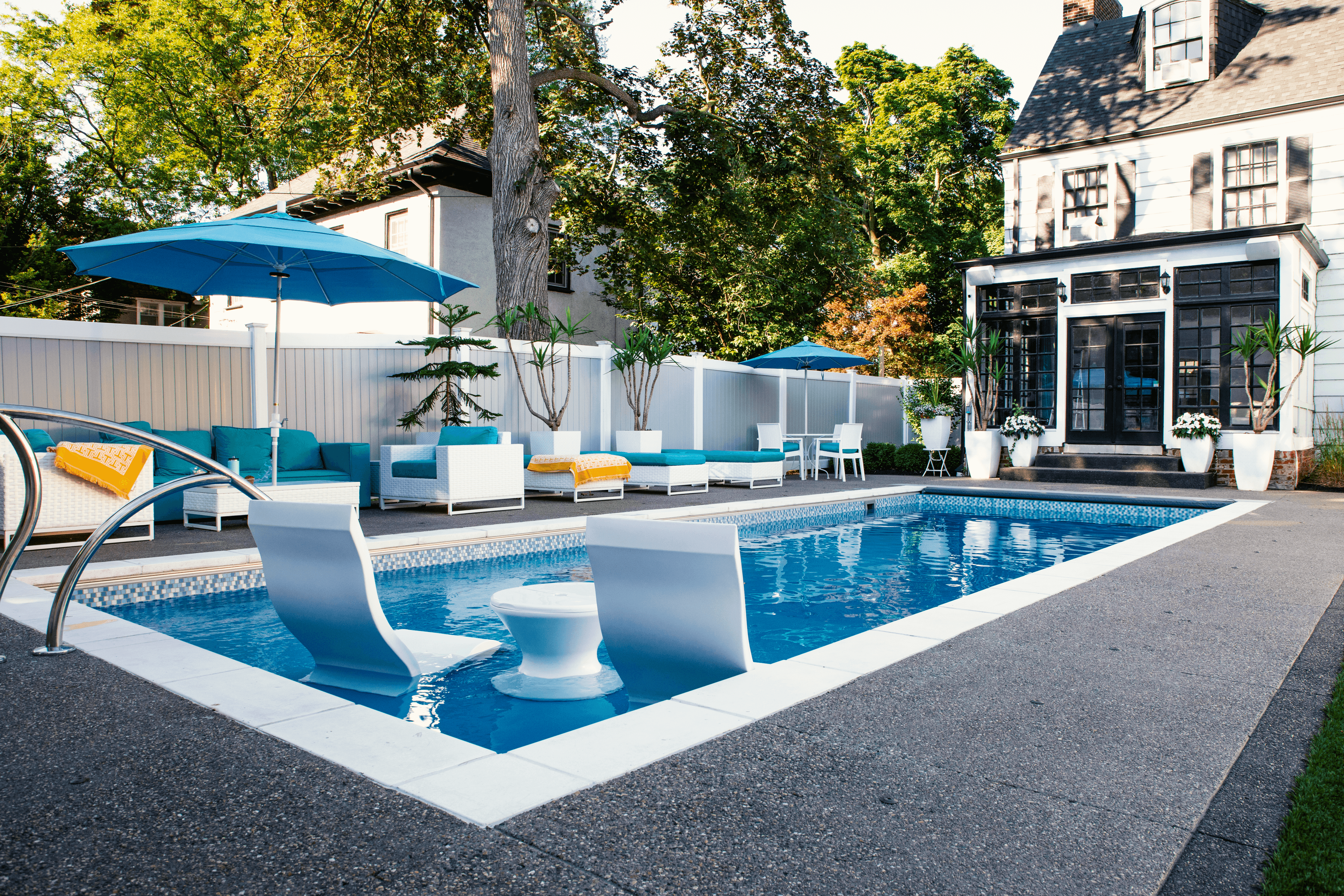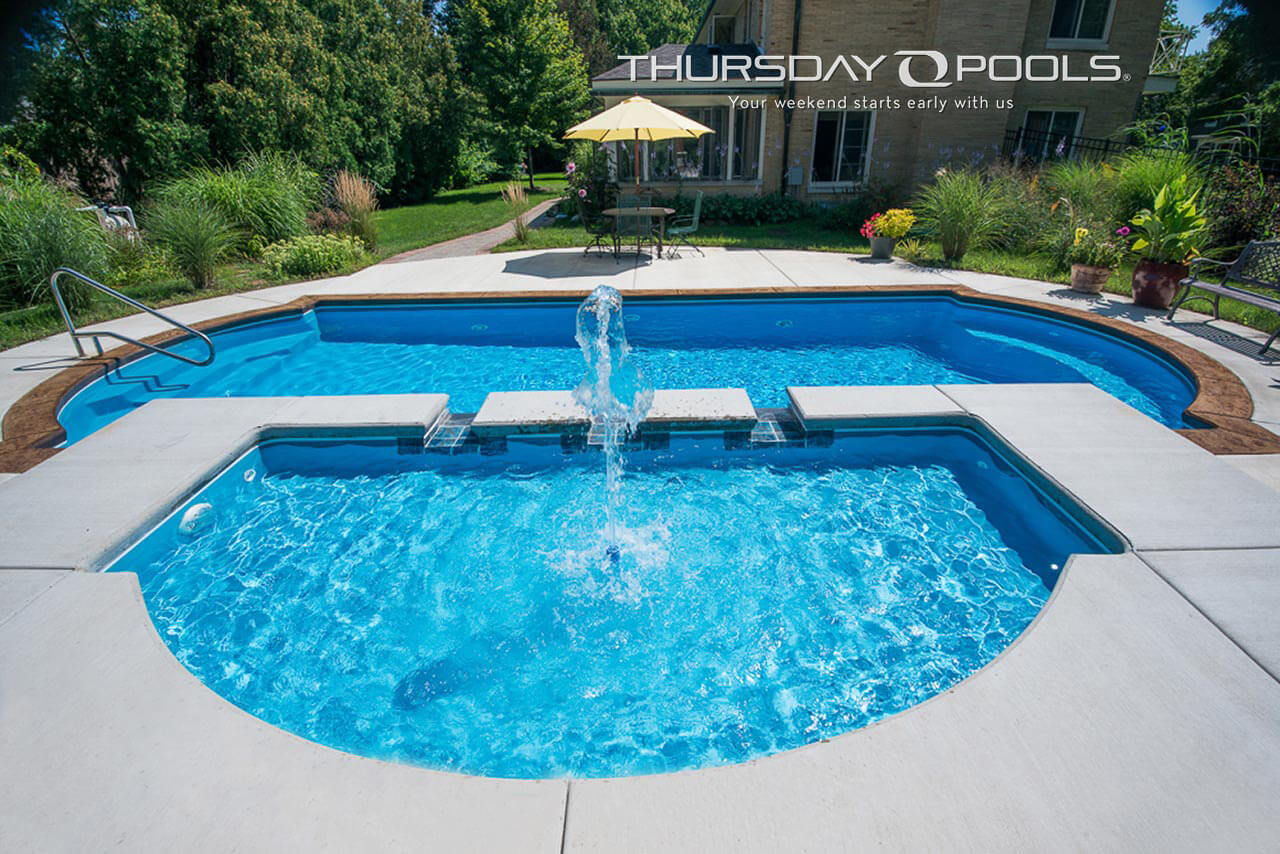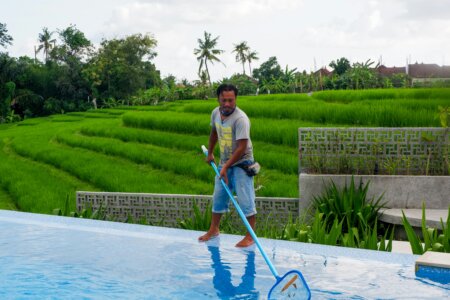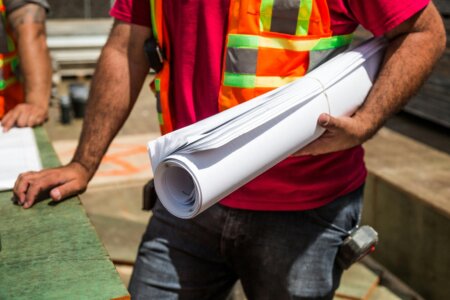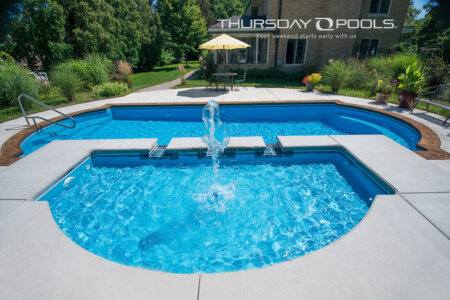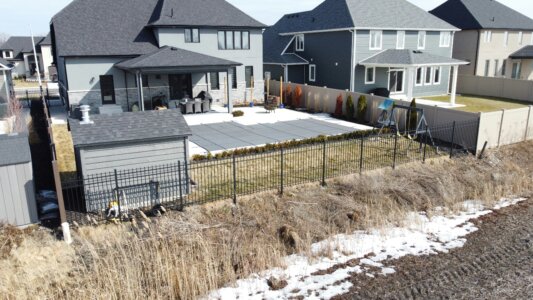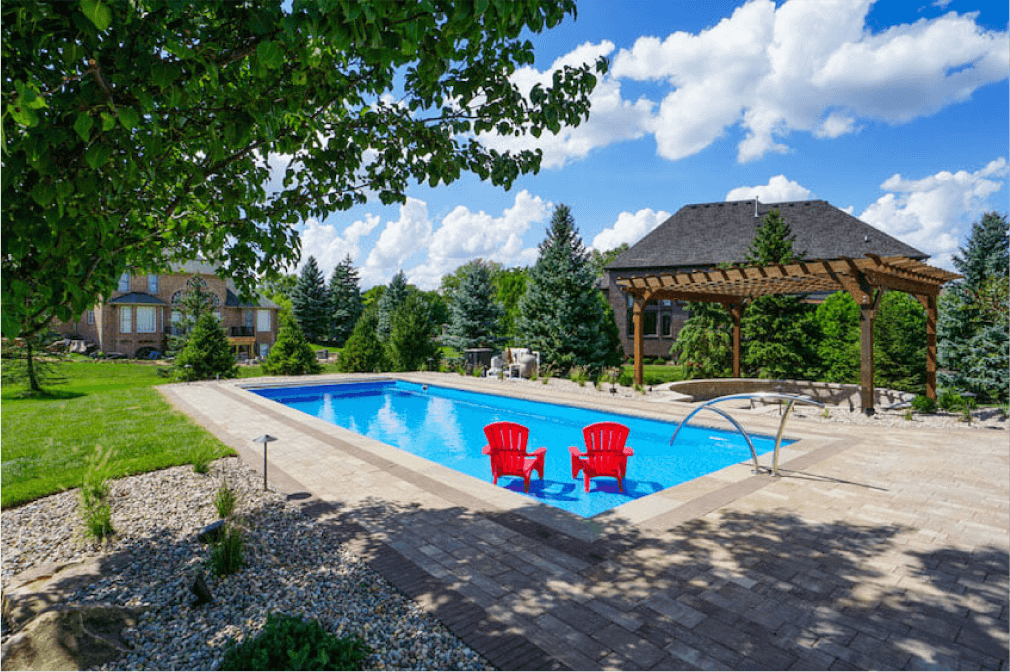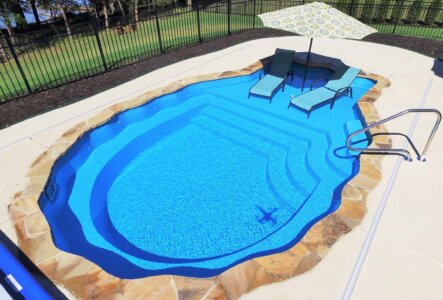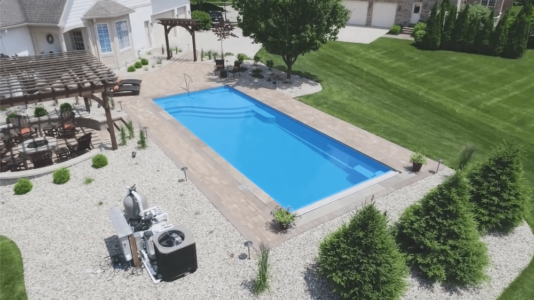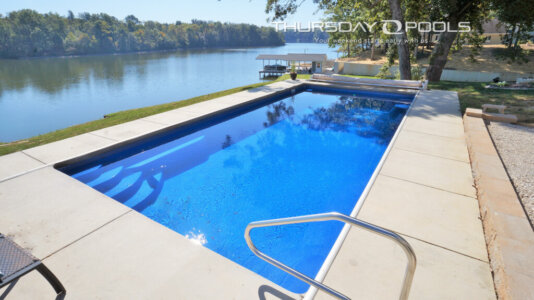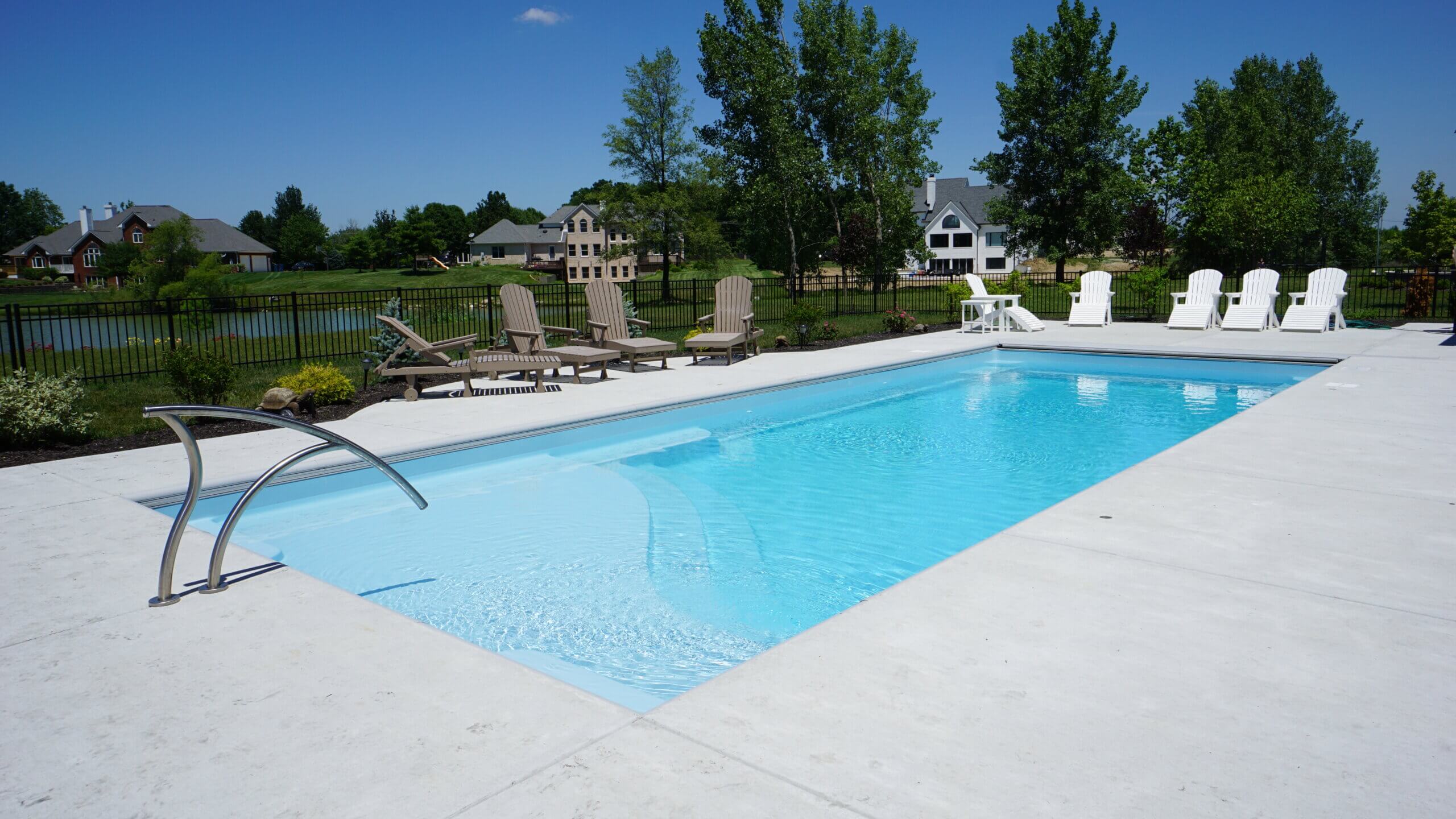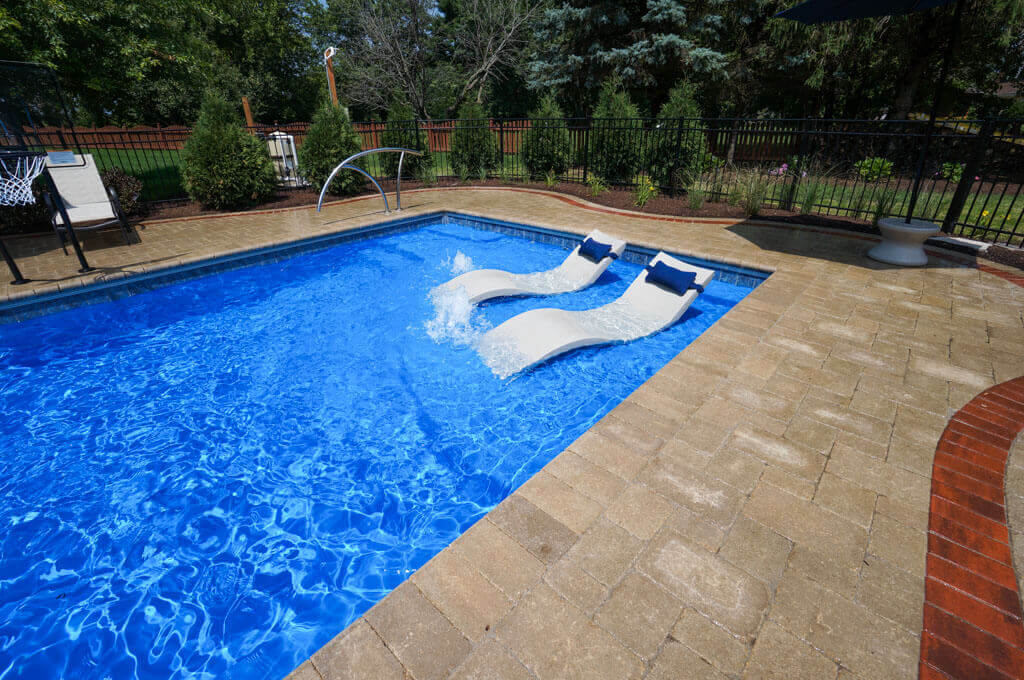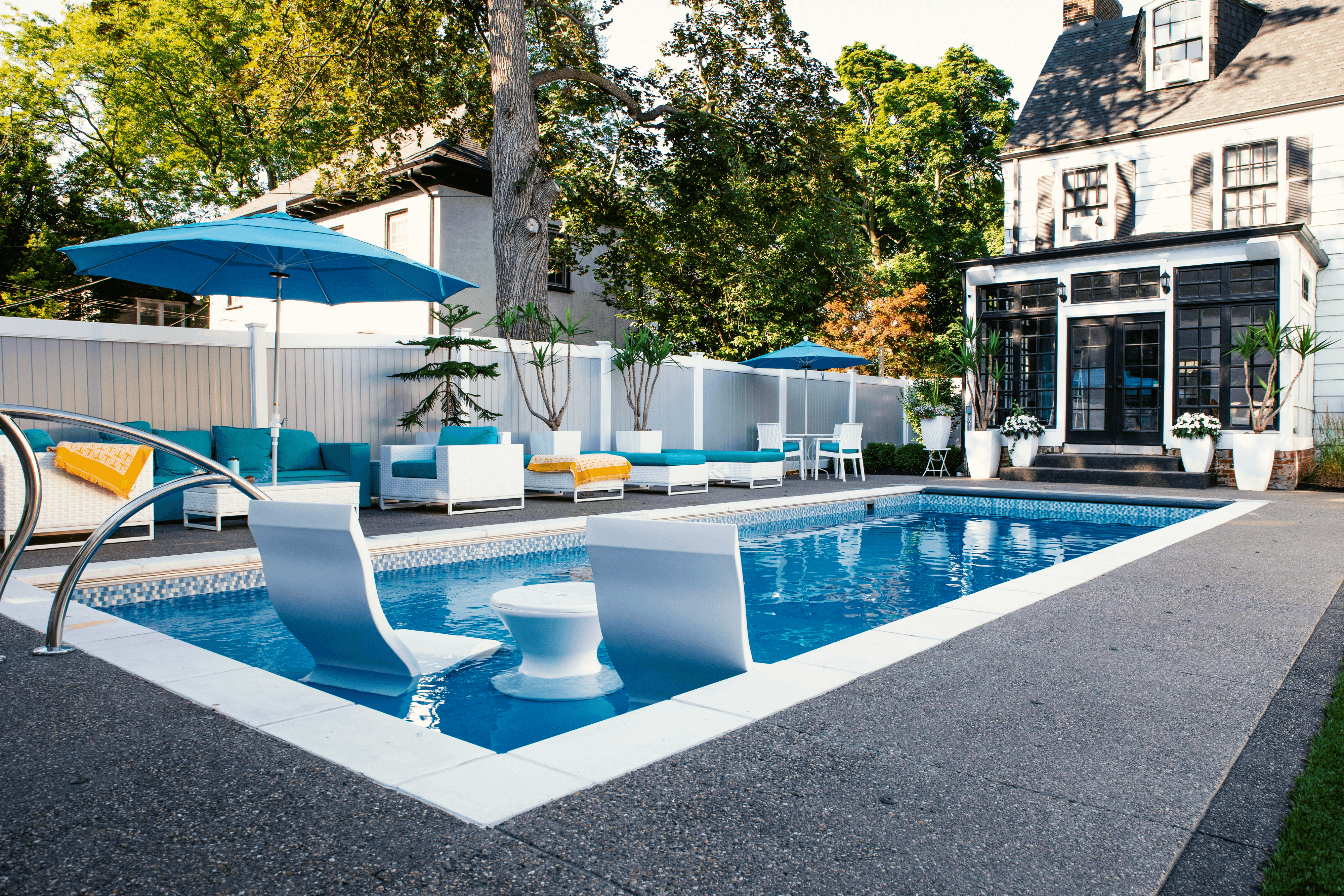When considering the cost of a fiberglass pool in Indiana, geography and local regulations significantly shape the overall price. In cities like Indianapolis and Fort Wayne, unique soil conditions can make excavation a bit trickier, which may drive up costs. Rural areas, like those in Southern Indiana or near the shores of Lake Michigan, often have more space and flexibility to design your dream pool and help keep expenses in check.
Local zoning laws are another factor to remember—larger cities typically have stricter fencing, permits, and safety rules, which can add to pool installation costs. Fewer restrictions allow you to craft a more customized pool layout in more rural areas. And don’t forget about optional upgrades like pool heaters to extend your swimming season or custom landscaping that integrates your pool seamlessly into Indiana’s natural landscapes—these features can elevate your backyard oasis but will also impact the final price. Whether you’re living in the heart of the city or enjoying the quiet life of the countryside, thoughtful planning is the key to designing a pool that fits your dreams and your budget in the Hoosier State.
What’s the Average Cost of an Indiana Fiberglass Pool Installed? Survey Says …
Following a thorough 2025 survey of our independent dealers across the state, Thursday Pools has compiled valuable data to provide an overview of typical fiberglass pool costs in Indiana.
AVERAGE INDIANA FIBERGLASS POOL INSTALLATION BY SIZE
|
| Pool Type |
Small Fiberglass Pools |
Medium Fiberglass Pools |
Large Fiberglass Pools |
| Size Range |
Up to 26 ft Long or 400 ft² |
26 to 34 ft Long or 400 to 600 ft² |
35 ft and Longer or 600+ ft² |
| Average Cost |
$80,000 |
$100,869.57 |
$122,608.70 |
Keep in mind that fiberglass pool costs will vary depending on the size and shape of the pool you choose and your specific location within Indiana. Contact a nearby Thursday Pools dealer for a custom quote and learn about financing options for your Indiana pool installation.
Average Cost of Popular Pool Models Installed in Indiana
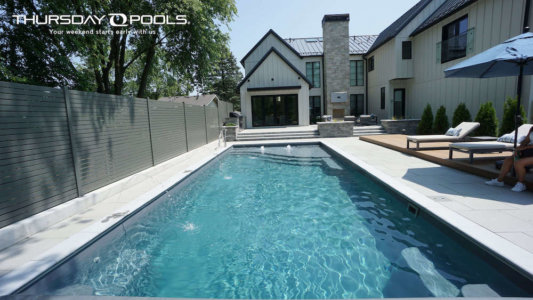
ASPEN (12’ x 25’)
The Aspen is available in five versatile sizes, with the most miniature option ideal for more compact backyards throughout Indiana’s urban and suburban neighborhoods. It features plenty of space for swimming, along with a built-in tanning ledge that provides a perfect spot for relaxation or keeping an eye on younger swimmers.
Based on feedback from Thursday Pools dealers across Indiana, the average cost for a standard Aspen installation or other small Thursday Pools design less than 26 feet long and 400 square feet is $80,000.
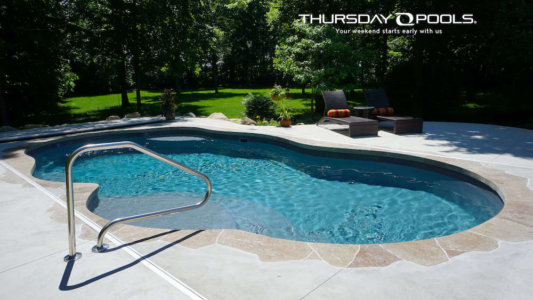
SUN DAY (15’ x 30’)
The Sun Day combines elegant freeform design with functionality, making it perfect for mid-size or larger yards. Available in three sizes, the compact version of the Sun Day is well-suited for most suburban backyards in Indiana, leaving ample space for additional outdoor features. Notable highlights include a spacious landing pad, built-in entry stairs, wraparound benches, a deep-end courtesy ledge, and a separate swim-out sun shelf.
According to our survey of independent Thursday Pools dealers in Indiana, customers can expect to pay an average of $100,869.57 for the standard installation of the 15’ x 30’ Sun Day or other medium-sized Thursday Pools designs.
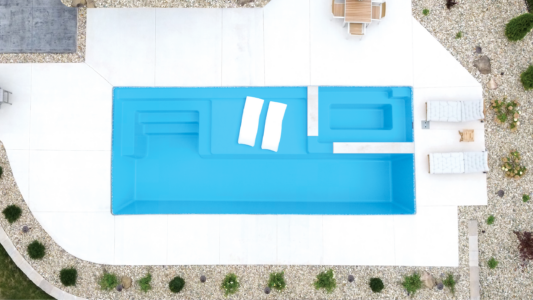
MACK DADDY (16’ x 36’)
For large backyards, the Mack Daddy offers the ultimate luxury. This pool design features a fully integrated spa with a spillway, a spacious tanning ledge, wraparound benches, wide entry steps, and a large, open swim lane with a consistent flat-bottom depth—perfect for both relaxation and swimming.
Due to its size (36 feet long and more than 600 square feet, larger pools like the Mack Daddy come at a higher cost. On average, customers in Indiana can expect to pay around $122,608.70 for the standard installation of a large fiberglass pool.
Factoring in Features of Your Indiana Yard
Indiana is known for a wide range of soil types, and the ground in your yard can greatly impact the overall cost of installing a fiberglass pool. Softer, sandy soils in some areas of the state may require extra support to ensure stability. Regions with clay-heavy or rocky soil can make excavation more difficult, which could increase labor costs.
It’s important to have a professional pool installer assess your soil type before breaking ground to ensure the proper preparation. While challenging soil conditions may raise initial costs, addressing them is essential for ensuring the pool’s stability in the long term.
In addition to soil conditions, factors like slope and yard accessibility can affect the installation process. Yards with slopes may require grading to create a level base, which adds to the installation’s time and cost. Properties with limited access—such as narrow gates or tight spaces—may need special equipment, like cranes, to move the pool shell into your yard. These factors can all impact the overall price, so understanding the specific characteristics of your Indiana yard will help you plan accordingly.
AVERAGE ADDITIONAL YARD-RELATED EXPENSES IN INDIANA
|
| Excavating Sandy Soil |
$2,343.48 |
| Excavating Clay Soil |
$1,756.52 |
| Excavating Rocky Soil |
$3,200 |
| Above-Average Slope Requiring Extra Grading |
$4,256.52 |
| Limited Yard Access |
$4,673.91 |
Indiana Swimming Pool Fence Safety Requirements
The Indiana Department of Health requires swimming pool fences to meet specific safety standards to protect swimmers, especially children. The fence must be at least 4 feet tall and serve as a secure barrier around the pool. Gates within the fence must be self-closing and self-latching, with the latch positioned at least 54 inches above the ground to prevent young children from opening it.
The fence should be continuous, with no gaps larger than 4 inches between slats, to prevent children from slipping through. The fence should be constructed from durable materials such as wood, metal, or mesh, ensuring it is sturdy enough to resist being knocked over or climbed. These requirements help to create a safer pool environment and reduce the risk of accidents. Always check local regulations, as additional requirements may apply depending on your specific county or municipality.
For a 300-foot linear-feet fence, our independent Indiana dealers estimate homeowners can expect to pay an average of $4,691.30.
Budgeting for Pool Upgrades in Indiana
Upgrading your fiberglass pool with optional features can transform your backyard into a luxurious retreat. While these additions aren’t necessary, they can enhance comfort, convenience, and fun for your family. Based on our 2025 survey of Indiana pool dealers, here are the average costs for popular upgrades.
Pool Heater Average Cost in Indiana: $4,078.26
Extend your swim season with a pool heater that keeps the water at your ideal temperature, even on cooler days.
UV Filter System Average Cost in Indiana: $2,908.70
Improve water clarity and reduce chlorine use with a UV filter system that eliminates bacteria and algae.
Pool Automation and Smart Control System Average Cost in Indiana: $5,152.17
Control temperature, lighting, and filtration from your smartphone for easy, efficient pool management.
Poured-Concrete Patio (Approx. 1,200 Square Feet) Average Cost in Indiana: $10,934.78
Create a durable, low-maintenance deck area with poured concrete, ideal for Indiana’s freeze-thaw conditions.
Paver Patio (Approx. 1,200 Square Feet) Average Cost in Indiana: $9,717.39
Add elegance with a paver patio, available from concrete to natural stone, perfect for Indiana’s climate.
Non-Automatic Safety Pool Cover Average Cost in Indiana: $4,452.17
A manual cover is an affordable way to secure your pool and keep debris out.
Automatic Pool Cover Average Cost in Indiana: $12,804.35
For ease and convenience, an automatic cover offers simple, one-touch operation to protect your pool.
Automatic Pool Cleaning and Vacuuming System Average Cost in Indiana: $3,586.96
Save time with a built-in pool cleaning system that keeps your pool spotless with minimal effort.
Surrounding Landscaping Average Cost in Indiana: $7,982.61
Add beauty and privacy to your pool area with landscaping, including rocks, plants, and trees.
Simple Pool Slide Average Cost in Indiana: $4,056.52*
A classic slide adds excitement to your pool, perfect for family fun.
Deluxe Pool Slide Average Cost in Indiana: $6,434.78*
For a resort-like experience, a deluxe slide offers more height and twists for extra fun.
*Thursday Pools strongly advises against pool slides due to safety concerns.
Diving Board (Type 1 Diving Pools Only) Average Cost in Indiana: $3,308.70
Only certified Type 1 diving pools allow diving boards. Always follow safety guidelines for depth and slope.
*Thursday Pools strongly advises against pool slides and diving boards due to safety concerns. The inclusion of a diving board or slide with any fiberglass pool must be carefully reviewed by a licensed professional to ensure compliance with all local building codes, safety regulations, and manufacturer guidelines. Not all fiberglass pool models are suitable for diving or slide use. It is the responsibility of the homeowner and installer to ensure proper installation and usage. Always prioritize safety and consult a qualified expert before adding any diving or sliding feature to your pool.
Specialty Waterline Tile Average Cost in Indiana: $3,852.17
Add a unique touch to your pool with stylish waterline tiles.
LED Pool Lights Average Cost in Indiana: $2,514.13 per light
Set the mood with LED lighting, which offers ambiance and nighttime visibility.
Deck Jets Average Cost in Indiana: $1,660.87 per jet
Add elegance with water jets that create beautiful arcs of water from your deck into the pool.
Bubblers Average Cost in Indiana: $2,195.65 per bubbler
Enhance beach entries and tanning ledges with bubblers that create a fun, relaxing atmosphere.
Cascades or Waterfalls Average Cost in Indiana: $5,852.17
Add a peaceful, spa-like vibe with a cascading waterfall made of natural stone.
Add-On Spa Average Cost in Indiana: $10,965.22
Create a luxurious poolside retreat with a spa that offers relaxation and therapeutic benefits year-round.
These upgrades can elevate your pool’s functionality and aesthetics, making it a more enjoyable and relaxing space. Consider your budget and yard space when selecting features to create the ultimate backyard getaway!
Transform Your Indiana Backyard into a Personal Paradise with a Fiberglass Pool
Bringing a fiberglass pool to your Indiana backyard isn’t just about adding a swimming pool—it’s about creating a space for making memories where your family can relax. Whether you’re in the heart of Indianapolis, the charm of Fort Wayne, or out in the peaceful countryside, the right pool size, design, and features can turn your vision into a reality.
Since every pool installation is as unique as your backyard, the best way to get an accurate cost estimate is by connecting with a local independent Thursday Pools dealer. They’ll assess your property’s specific conditions, offer guidance on excavation, accessibility, and site prep, and help you choose the pool design and features that work within your budget.
Ready to make your backyard dreams come true?
Get Your Personalized Estimate
Thursday Pools® manufactures fiberglass pool shells and does not install pools. Pools are installed by locally owned independent dealers. Consumers should consult a local independent dealer for the most accurate and updated information based on the unique conditions of their region and property.
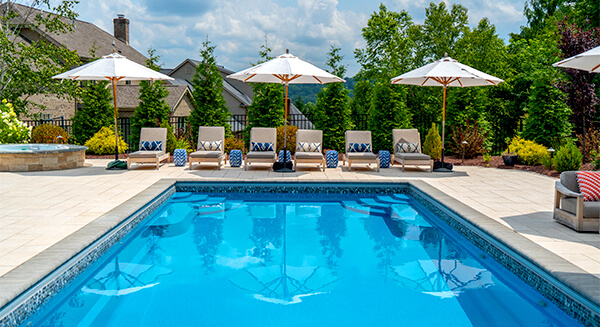
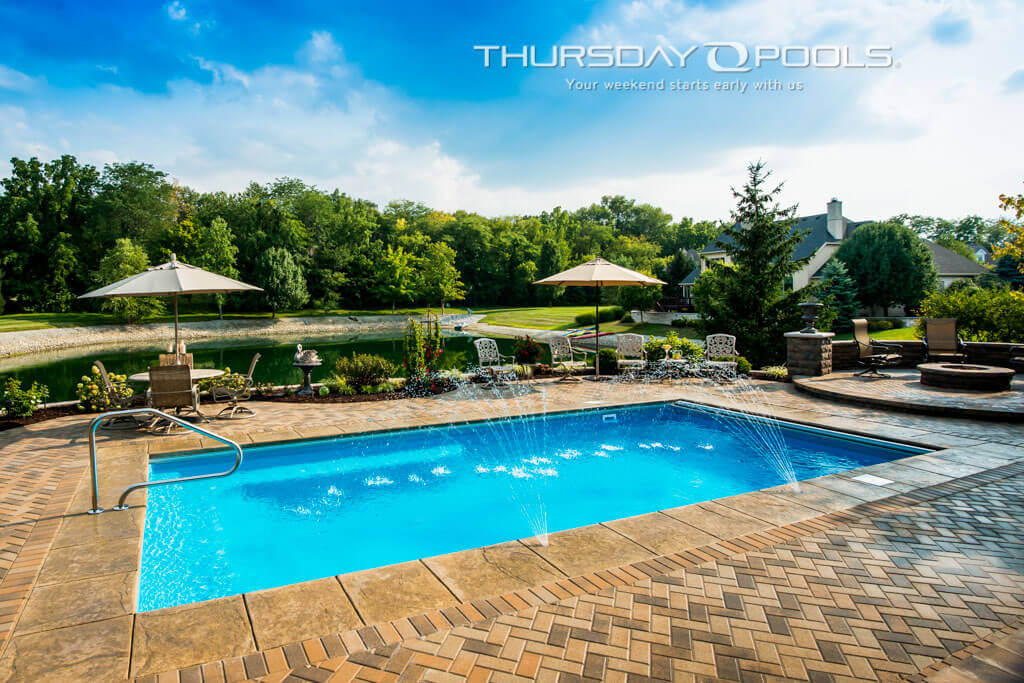
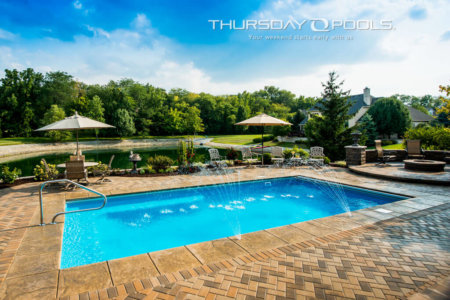 You’ve heard a lot about how great fiberglass pools are. You may be interested in lower maintenance and long-lasting, or maybe you like built-in tanning ledges or the fact that they’re pet friendly. Still, the one question you can’t get out of your mind is, “Are fiberglass pools worth the extra cost?” While they have surged in popularity over the last decade,
You’ve heard a lot about how great fiberglass pools are. You may be interested in lower maintenance and long-lasting, or maybe you like built-in tanning ledges or the fact that they’re pet friendly. Still, the one question you can’t get out of your mind is, “Are fiberglass pools worth the extra cost?” While they have surged in popularity over the last decade, 
